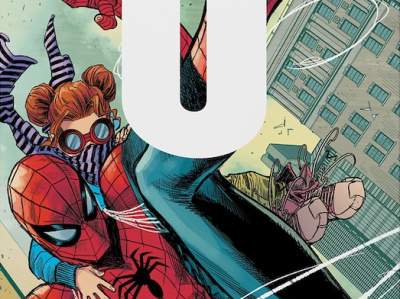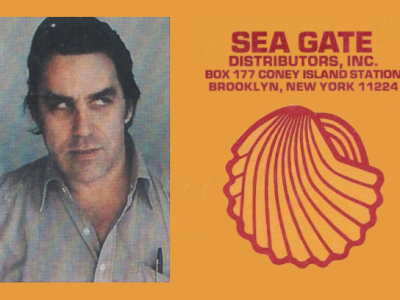Cupcakes or comic books? That was the choice Brandy Cross gave herself.
Cross had retail experience from previous mall jobs selling games, movies, and music, and host of degrees: Anthropology ("It didn’t get me anywhere, because it was Anthropology"), and a bachelor’s in Business and Accounting, followed by a master’s in Business and Accounting. She was also feeling burned out in her accounting job. So she huddled with two good friends, Gabriel Halicks and Alfonzo Lawhorn.
"I thought, 'Okay, I have all this business knowledge. I am good at business. And I was good at retail management, so... why not just open my own retail business?'" Cross remembers today. Her mind went in two directions.
"I am a fairly accomplished baker, so I wrote two business plans," she says. "One was for a bakery, and one a niche, boutique, books-comics-collectibles thing. After looking at the plans and discussing them, we decided that we could manage a bookstore format with just the three of us at first. So that’s the direction we went."
Distant Planet launched on February 3, 2015 in Columbia, Missouri with a vibe, a business plan, and a raison d’etre different than most stores: It’s ethics-focused, open only four days a week, and caters to an eclectic mix of college students and rural shoppers.
Cross and Halicks have since married, and Lawhorn brings the comics passion. Cross is in a way happier place ("I eventually figured out I just didn’t really fit in with accountants"), and along the way, the store has been a wonderful learning experience…
THE GOOD
CREATE A COMMUNITY
Everyone says they treat customers like family. At Distant Planet, that’s a two-way street, with giant impacts.
"We support them, they support us," Cross says. "When you create that community, no matter what’s going on, they will take care of you, because you’ve taken care of them. A good example is a few years ago, I was really sick, and I had to have surgery. But I couldn’t afford the surgery; my deductible was just too high. There was no way I could afford this surgery that I absolutely had to have to continue. So the community, both locally and nationally-globally through other stores I made friends with, raised enough money to meet the deductible to get the surgery."
Cross was grateful almost beyond belief, and pays it forward.
"When we hear about someone in the community struggling, we’ll go and make a fundraiser and help out," she says. "It becomes one big family."
There are small impacts, too, always graciously noted.
"Even today, I have customers who know I basically run the shop alone because my two business partners have full-time jobs, so they’ll bring my lunch," Cross says. "They’ll call to see if I need something run down to the post office when I’m stuck here."
SET THE PLAN, SET THE ETHICS
Cross plants both feet firmly on the ground when she explains what Distant Planet is to her and her partners.
"This store isn’t just a business; it’s an extension of ourselves," she says. "So the things that we hold dear come through in the store. Right from the start, we wanted to achieve, sure, but we wanted to be an ethical store. We wanted to stand up for thing things that we find important."
Some of it is found in product selection.
"I have Asperger’s Syndrome, so that’s something we’ve very vocal about. I’m also queer, so that’s something we’re vocal about," Cross says. "Alfonzo is a Black man, so we promote a lot of Black creators and talk about things like that. And as a result, we’re able to guide people to read things that maybe they wouldn’t normally read. It can open up their minds and their lives to things they haven’t been exposed to before."
And the exposure goes well beyond comics.
"We’ve created a section called ‘Be a Better Human,’ and it’s not comics," Cross says. "It’s mostly prose books, resource books, anti-racism, anti-capitalism, queer titles. These are not things you typically find in a comic shop at all, but the community has absolutely embraced it and run with it. And we listen to the community, see what they want. We’re adaptable to their needs."
Bottom line, it’s all something that sets Distant Planet apart, and makes the team feel good at the same time.
"Start with the core ethics you hold dear," Cross says "You have to build that into your business plan."
PLAY WELL WITH OTHERS!
Seems like we see it more and more: Retail can be competitive, but retailers who collaborate prosper.
"I’ve become friends with other shops’ employees, owners, and managers all over the country and all over the world," Cross says. "And what’s so important in becoming actual friends with people like that is that you can learn from each other by sharing ideas. And even if you’re just having a bad day, you can reach out to other friends who have similar stores, similar experiences, and just say, ‘Hey, I’m really not feeling it today. I need some emotional support.’ And you’ll get it. They’ve had the same experience you have."
Emotional support is nice, but Cross says a great practical is the ability to collaborate on projects a single store might not be able to do, but a scaled-up consortium can. Take the Bastard Title Edition project, a shared exclusive dreamed into existence by Distant Planet and five other stores.
"We contact an artist of our choice for a book of our choice and ask them to do an exclusive dustjacket just for the Bastard Title group," Cross says. "Now we’ve got an exclusive item any one store would not have the resources to do, but six stores can now share in."
The first Bastard Title Edition is Dracula Motherf**ker by Alex di Campi and Erica Henderson.
"We had Yuko [Shimizu] do an exclusive dustjacket for our stores, and then Alex and Erica did a signed bookplate," Cross explains. "So we have a limited edition, 500-copy run of this hardcover book that you can only get from our stores, period. Something we’d never be able to do on our own we now can because there’s six of us combining our money and resources."
THE BAD
DON’T LEAN ON ONE DISTRIBUTOR
Market conditions have forced many stores’ hands in diversifying distributors, but Cross was an early adopter. After a short break-in period, that is.
"At first, we were too dependent on just one or two distributors," she says. "You really need to branch out."
Cross thinks the point-of-view is just as important as supply chain.
"If you’re relying on just one or two distributors, you’re going to get a really skewed view of the comics business, and you’re not going to have a cushion when one of those distributors fails you," she says. "It was like looking at a completely different world as soon as we branched out and started getting books form six, seven, eight different distributors; going direct through some publishers. It opened up a whole new world once we branched out."
Cross knows there’s an efficiency to consolidating accounts, but is willing to put in the sweat.
"It takes a lot more work, but it’s totally worth it, because it cushions you, it insulates you, and it can lead you down a path you didn’t even know was there," she says. "I think lot of stores are just now learning it. I think far too many people are 100% dependent on the main distributor, Diamond, that they literally don’t even know what else is out there, and I think their business is suffering because of it."
DON’T OVER-ORDER
Sellouts are a good thing at Distant Planet; remainders, not so much.
"It is better to sell through something and be like, ‘I’ll reorder it for you,’ or maybe point someone to another store than to be stuck with old product that you’re going to have to sell at a loss later on," Cross says. "It takes up real estate, you have to manage it… it’s better to just sell out."
Many stores like to be all things to all people. Cross is happy to point her customers to those stores as needed.
"Customers will understand, especially if you show them somewhere else to get it," she says. "They will remember that maybe you don’t have it this time, but you were helpful. They will come back to you because they know that you have information as well as product."
Cross says this is the advice she doles out most often.
"I preach this to new stores all the time to the point where they’re, ‘Okay, we get it, we get it. Enough, already!’"
REGULATE SIGNAL TO NOISE
Our information society can be a wonderful thing. Once you find your lane and your speed, that is. It took Cross a little while to separate wheat from chaff.
"I paid far too much attention to the big retailer forums and would take things that were said there very personally," she says. "That was something I did very wrong. I opened myself up to far too much criticism from other store owners who thought that their way was the only way."
Cross says she’s learned to, "Grow some thick skin, and walk away from that. Because your store is unique, you know what’s best for your store, and you cannot take comments from people who can’t understand that personally."
A perfect example: Distant Planet’s operating hours are not a one-size-fits-all suit.
"We’re only open four days a week, eight hours each day," Cross says. "I need time to do paperwork, and I need time off. There’s only one of me. I need a break sometimes. I got a lot of flak from that, people telling me I was just a hobbyist; didn’t know what I was doing. But I have a masters in this, so I kinda do know what I’m doing, business-wise, and I also know I can’t kill myself working too hard."
AND WHAT ELSE?
"I always liked comics, but I was never into them as much as my business partner, Alfonzo, was. It was a roundabout way to get into it, but here we are, and I’m happy. We’re all happy."
"I cannot get rid of my other partner, Gabriel Halicks, because I’m married to him. He also keeps the IT running, because that’s his actual profession. And he keeps me fed. So there you go."
"When I told people I was leaving accounting, they were like, ‘What? You’re going to go and work for nothing? You’re going to walk away from this great career where you can make six figures?’ And I was like, ‘I don’t want that career.’ It’s not worth it. Not when I’m not getting what I need out of the system. So I basically walked away from the system."
"Reaching out to stores in other states and other countries has really opened up a lot of doors. And I have actually made some of my closest friends in the world this way."
"I’m one of those people who does not mind failing. Even if I get hurt I’m going to learn from it."
"Probably the most important thing I’ve learned in this almost-seven years in this business is that you have to take care of yourself. Your health comes first. If you fail, the shop is going to fail. Build in your days off. And when you get sick… gone, gone are the days where I sit behind the counter with a bucket because I have the flu or something. We ran ourselves sick, almost to death, the first few years. We would not close down for any reason. We were open longer hours, more days. But we learned our lesson. Take care of yourself so you can be the best person in the store for your customers."
"We’re in a college town, and we’re a shopping hub for the rest of Missouri. In Missouri, there’s really just Kansas City, St. Louis, and us in Columbia. And we’re right in the middle of that, so we become the shopping hub for small towns, rural communities. So every day, I have new people in the store, someone who’s never been here before."
"One thing that I think a lot of shops have come around to is that having a solid young readers section will bring you so much happiness. It will be more rewarding than any other section in the store, and pays off tremendously versus the amount of work you have to put in to it. Getting comics and books into those kids’ hands and watching them fall in love with something that you already love makes all the bad days just fade away."
"I had a young girl customer who had just lost her mother. She got depressed, withdrawn. Her dad brought her in, and I hooked her up with the Lumberjanes books. The change in having someone take an interest in her and what she was going through and give her something else to focus on completely changed her emotions. She started to read more, she became more outgoing, she got into art, and knowing that I had that effect on a young person’s life made every jerk that’s ever walked through this door just fade into nonexistence."
"Now she comes in, and she’s growing into this young adult and she’s found this amazing creativity because someone took the time to put something into her hands that they loved, because they thought she’d love it, too. Her and her father have become part of our family now. They’re both very creative people; they make things for us, they come to events and help out. It’s great."
Click Gallery below for store pics!



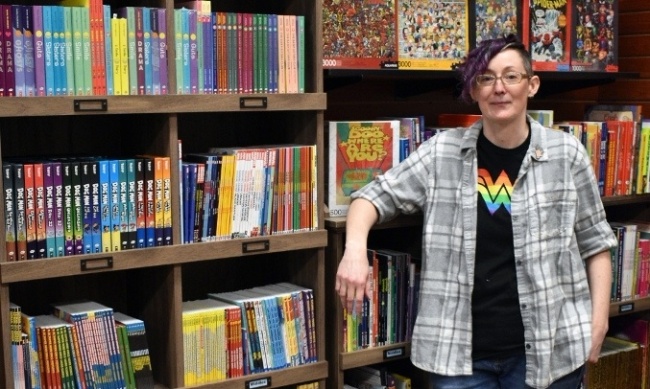
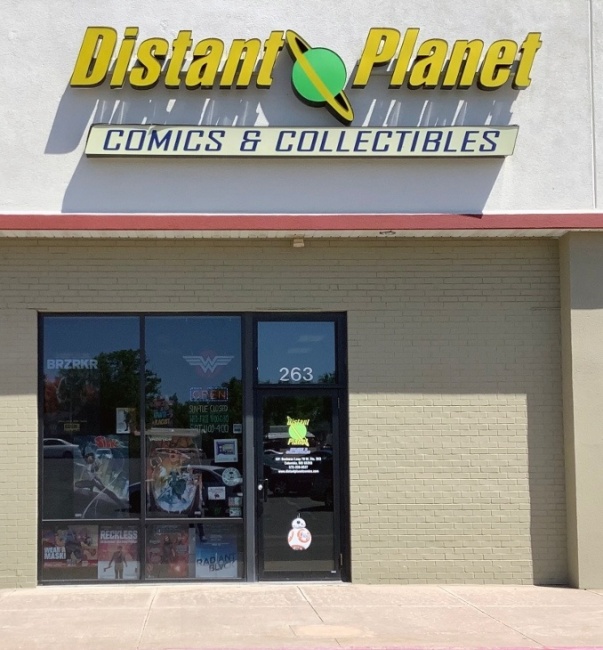
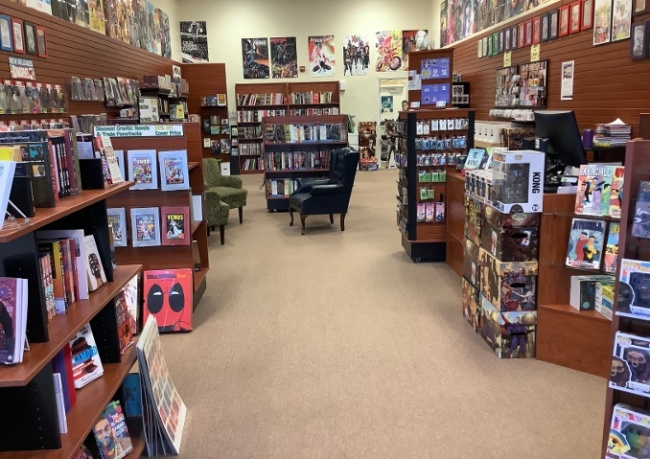
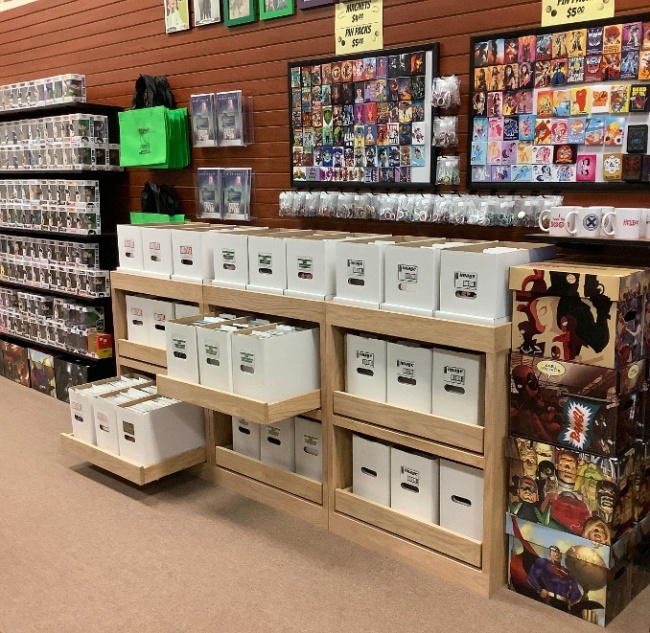
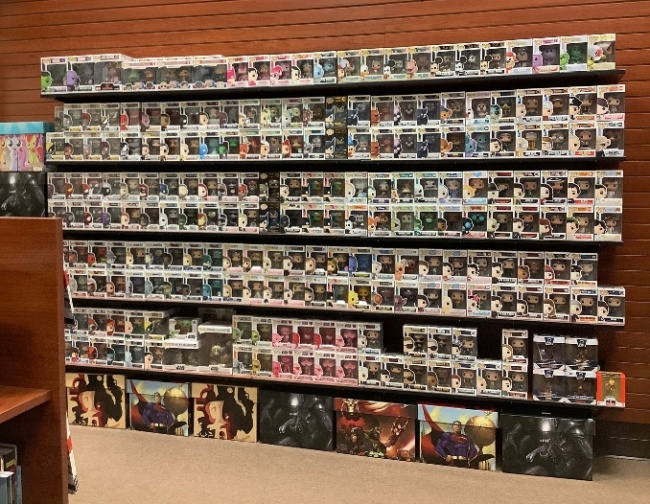
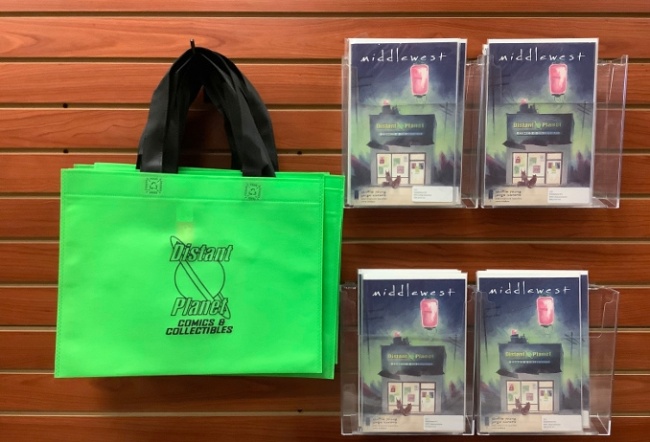
 View Gallery: 14 Images
View Gallery: 14 Images 